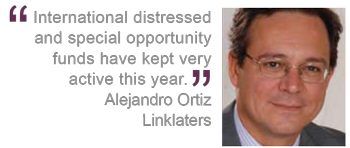Special Focus: Private Equity 2014: Looking for bargains
Optimism is returning to the Spanish and Portuguese private equity markets, as attractive assets become available at good prices – but the greater complexity of private equity deals, and the increasing demands of clients is posing challenges for law firms.
Private equity (PE) has seemingly been a sellers’ market since the recession took hold. Indeed, White & Case research claimed there were 702 European PE exits during 2013, the highest number on record. Bailouts, the collapse of the savings banks (cajas), “toxic assets” and the dearth of available bank debt have had an adverse effect on levels of investment and business confidence.
However, José María Gil Robles, a partner at Garrigues, is optimistic in his outlook. He acknowledges that it is difficult for PE investors in Spain at the moment – with the lack of financing and uncertainties about the future of the euro and the economy – but despite this, he sees things changing: “Planes from London to Madrid are again packed with investors visiting Spain searching for opportunities, some are recruiting ‘scouts’ to search for deals – every month we see new investors deciding to have a permanent presence in Spain.”
What does this mean for lawyers in Iberia? Some lawyers say it is important that clients choose law firms with in-depth knowledge of the relevant jurisdiction – whether that be tax, insolvency, litigation or regulation, for example – rather than merely opting for the local branch office of the international players. Meanwhile, other lawyers claim that the line between legal work and financial consultancy services is becoming increasingly blurred as private equity clients increasingly turn to their legal advisers for business development advice.
Investment firm Kohlberg Kravis Roberts & Co (KKR) this year opened in Madrid with Cinven reportedly planning to launch soon. Players such as Doughty Hanson, 3i, HIG Capital, Permira and Bridge point are already in Spain.The renewed interest follows decreases in sellers’ asking price, the availability of decent assets, the improved availability of finance and the creation of a public “fund of funds” to invest in Spanish venture capital. All of which strikes a chord with PE investors.
Restructuring fuelling PE deals
Enthusiasm is growing in Portugal too as investors are attracted to distressed assets, including share capital increases, loan portfolios sales, non-performing loans, disposal of real estate assets and bonds issues deals.
Francisco Brito e Abreu, partner at Uría Menéndez, says Portuguese PE interest was helped by the privatisation programme implemented by the government following the Troika, as well as by the distressed market. “This interest was further fuelled by the radical restructuring processes that several Portuguese companies and groups are undergoing,” he says.
Duarte Schmidt Lino, the partner who leads PLMJ’s private equity team, says Portugal has been increasingly under the spotlight of international PE funds: “Not surprisingly, as a result of economic challenges the Portuguese economy is currently facing, there are some business opportunities for private equity funds, particularly in the real estate, insurance, tourism, health and banking sectors.”
The uptick in interest goes someway to explaining the apparent exit-heavy strategy – lawyers say the exits provide additional capital for new deals. In Spain, Mariana Norton, partner at Cuatrecasas, Gonçalves Pereira, suggests that funds feel more confident: “[They] shifted their focus from managing their portfolios on a low asset rotation to actively looking to divest their equity holdings – as rising stock markets are allowing different exit strategies – and make new investments in Spain and Portugal.”
Big deals are back
It is the stock markets that are providing the best exit returns to PE of late. White & Case said PE initial public offering (IPO) exits increased by 350 percent in Q1 2014 compared to Q1 2013. Recent Spanish listings include eDreams Odigeo (owned by Permira and Ardian) and Applus (owned by a Carlyle-backed group), while the Bain Capital-backed call centre company Atento is presently reviewing an IPO.
Garrigues’ partner José Manuel Martín García remarks: “We are seeing divestments through listings, and this is allowing investors to sell the large companies that they acquired in the booming times, so reasonably large deals are back.”
The new capital is powering the surge in transactions, particularly in bank and real estate assets. US funds have been active: Oaktree Capital Management purchased a Spanish real estate portfolio from ING; Blackstone Group paid €6.5bn for a collection of Catalunya Banc’s mortgages; and KKR has made $1.2bn of investments in companies like Inaer, Uralita and Port Aventura.
Linklaters partner Alejandro Ortiz says private equity investors are showing a particular interest in the energy and infrastructure sectors. He adds that “international distressed and special opportunity funds have kept very active this year”. Meanwhile, Ortiz says that private equity houses are launching IPOs of their portfolio companies, while real estate investors are launching SOCIMIs [sociedades cotizadas de inversión en el mercado inmobiliario] – the Spanish version of a real estate investment trust – in order to invest in real estate assets.
Francisco Aldavero, a partner at Araoz & Rueda, says the positive Spanish macro-economic figures have boosted PE interest too. “Investments have grown more than 130 per cent during the first quarter of 2014 compared with same period of 2013,” he explains. “Despite these figures and the enthusiastic mood, private equity funds are still slow, mainly because financing is not there yet.”
In Portugal, funds like Vallis Capital Partners and Apollo Global Management (which was in talks to purchase the insurance unit of BES) are targeting the market. Marcos Sousa Monteiro, a counsel at Linklaters’ Lisbon office, adds that Apollo – as well as other PE firms – were also previously bidders in the sale of Caixa Seguros, while the sell-offs of healthcare operator ES Saude and Portuguese Post (CTT) have boosted interested. “Other privatisations include Portuguese waste management firm EGF, where several bidders were also PE firms, and state airline TAP – expected to be re-launched soon – is perceived to be in the radar of international funds as well,” he says. In addition, the potential sale of BBVA’s Portuguese business is interesting PE funds.
 Start-ups attracting investment
Start-ups attracting investment
Activity is increasing the appetite for new business and funds. Ricardo Andrade Amaro, from Morais Leitão, Galvão Teles, Soares da Silva & Associados, says a significant number of restructuring and turn-around funds have been incorporated and are pursuing opportunities to acquire debt from companies in distress – in particular, those with good growth potential – with the aim of selling those companies at a later date. “In the last year we have also witnessed a new trend where a number of start-up funds have started investing in innovative Portuguese start-up companies,” he adds.
Íñigo Erlaiz, a private equity partner at Gómez-Acebo & Pombo, expects new regulations in Spain to create more PE opportunities for lawyers. “The implementation of the Alternative Investment Fund Managers Directive (AIFMD), which is soon to be enacted in Spain, and which contains new regulations for private equity and venture capital, is sure to bring more work for law firms.”
However, lawyers are warning of potential challenges ahead. With regard to the AIFMD, the draft bill was published in July in Spain and includes reforms such as new closed-ended collective investment undertakings (EICC) and closed-ended collective investment funds (FICC), which are flexible structures that allow funds to invest in a variety of financial and non-financial assets. Other measures include SME private equity entities – which must invest 70 per cent of their net assets into shares, loans or hybrid financial mechanisms – as well as a relaxation of marketing rules (shares and units of firms can be advertised to certain clients and investors).
Uría Menéndez partner Christian Hoedl says extra burdens will be placed on fund managers: “Recently-enacted tax rules have impacted the traditional structure used by private equity investors for leveraged transactions.” Specifically, he highlights different restrictions on the deductibility of financing expenses and goodwill, and the application of the special neutrality tax regime. “The implementation of AIFMD will also impact the regulatory framework on the Spanish private equity sector and it is expected to set out additional obligations and requirements on fund managers.”
Shortage of good assets
Lawyers also warn that it may be difficult to find good assets with growth capacity given the market values, liquidity and increased competition.“The high leverage and depressed EBITDAs [earnings before interest, taxes, depreciation and amortization] on Spanish and Portuguese companies represent in many cases a low incentive for the sellers, since private equities are still trying to buy at low depressed prices,” Norton claims.
Erlaiz believes the lack of financing for leverage buy outs forces funds to implement new structures to finance deals or to invest larger equity amounts and assume more risks.“In a difficult environment, many funds find themselves with companies in their portfolio that are undergoing difficulties,” he says. “Managing these situations in a way that does not conflict with the term of the fund and/or which does not compromise the managers’ capacity to raise new funds in the future, is a challenge that managers face. Also, given that the market was paralysed for a few years, managers find that they may have to exit and complete disinvestments in a very tight time frame. Managing this situation with limited partners is also a challenge.”
Meanwhile, Martín García says investors willing to engage in restructurings also have execution risks, and those that prefer to invest in healthy companies seem to be concerned with Spain becoming “a too crowded place and prices skyrocketing”.
Schmidt Lino claims Portuguese companies, specifically their shareholders, tend to “resist the opening of their shareholding structure” to new shareholders, including private equity investors: “This is a cultural challenge in Portugal which is of course an obstacle for private equity investors.” He adds: “Additionally, once the investment is made, the structural problems which still affect the Portuguese economy are a problem that affects the capability of the private equity funds to successfully turn around the companies they invest in.”
Amaro also believes the scale of Portuguese businesses, mostly family-based small to medium size companies, means that many miss out on potential private equity investment. “These companies are not entirely prepared to have a PE investor and normally do not understand the requirements that need to be fulfilled by a private equity fund when investing, thus creating a gap between themselves and private equity investors,” he says. “As such, there is a significant number of interesting companies that could potentially attract PE investment but which investors are not willing to consider.”
Choosing the best law firm
What does all this mean for law firms operating in the private equity market? Hoedl says that, given that private equity deals are increasingly sophisticated and cross border, it is important that clients choose law firms with the best reputation in each jurisdiction rather than simply choosing the branch office of international firms. “They [private equity deals] require great expertise and transaction management skills in many jurisdictions,” he says. “The ability to choose the best law firm with a proven track-record in each jurisdiction, rather than the local office of a wider organisation, is a major advantage.”
Hoedl adds that true full service capability in tax, insolvency, litigation and regulatory, as well as public law is also a key factor. He says there is one other ingredient law firms need for success in the private equity market: “Knowing and understanding your client needs – for example, management incentives, exit rights in case of minority protection, representation and warranties insurance – and the sort of protections sought by private equity sponsors in their investments, such as indemnity protections and return commitments to investors.”
Meanwhile, Schmidt Lino says law firms operating in the private equity market must develop a “business-oriented” approach in order to provide a high standard of advice to clients. “Lawyers are also expected to look for business opportunities in their network, which may be interesting to their clients,” he says. “The line between the legal work (including the due diligence process and the drafting of the relevant documents) and the financial consultancy work is more often than not blurred.”
However, Schmidt Lino adds that this is a line that lawyers should be “prepared and willing to cross” when necessary. “Corporate finance, for instance, is a mandatory subject for any lawyer who works for private equity funds – lawyers need to speak the same language as their clients.”
The private equity markets in Spain and Portugal are creating new opportunities for law firms in Iberia, but in order to make the most of these opportunities, lawyers will have to be willing to step outside of their comfort zone and take on the responsibility for helping their clients develop their business.
What are the biggest challenges facing law firms operating in the private equity market?
José María Gil Robles, partner at Garrigues
“Legal uncertainty is for us a big challenge and sometimes an embarrassment, as it is difficult to explain to our clients why a given piece of legislation is amended several times in a very short timeframe.”
Mariana Norton, partner at Cuatrecasas, Gonçalves Pereira
“Offering a value-added service while being competitive is probably our biggest challenge in a very mature legal market with very sophisticated clients – the private equity firms are in transactions that are more complex as there are more diversified instruments.”
Duarte Schmidt Lino, partner at PLMJ
“The client expects the private equity lawyer to be technically sound and, at the same time, courageous enough to tackle new subjects because every transaction tends to have its specific twist. In addition, fund managers are always under a severe time pressure. To really help them lawyers need to be able to synthetize their message to the maximum.”
Ricardo Andrade Amaro, senior lawyer at Morais Leitão, Galvão Teles, Soares da Silva & Associados
“Specialisation. There are a small number of law firms that have specialised teams that can cover both the M&A, restructuring and financing part of the deals and have a comprehensive insight on the regulatory matters that need to be dealt with. What is more common is that the M&A teams in Portugal are those that handle private equity transactions and have little or no support from a regulatory perspective.”












